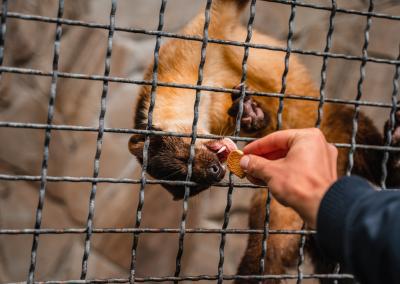ECJ: ban on fur farms not unconstitutional
The Constitutional Court (CC) on Wednesday ruled that the ban on fur farming enacted by the last parliament does not contravene the country's basic law.
„The legislator, exercising a broad discretion to formulate the economic policy of the state and to regulate economic activities accordingly by means of legislation, may by law change the economic conditions of a particular activity, taking into account the fact that the general welfare of the nation is not perceived in a purely material or financial sense“, – announced on Wednesday the Chairman of the CC Gintaras Goda.
According to the CC, the Seimas, in order to ensure the public interest in the protection of wildlife, which is enshrined in the Constitution, may by law restrict or prohibit economic activities related to the breeding of animals, if they are not necessary for society.
„The legislator (...) may not be guided solely by economic considerations. Having assessed that a particular economic activity is incompatible with certain principles of morality and ethics and humanity, it may impose restrictions, prohibitions on certain related activities, such as keeping, breeding and killing them for the production of certain specific products which are not necessary for the vital and existential needs of society, “, – said Mr. Goda.
According to the court, the mass breeding and killing of animals for profit is incompatible with the principles of morality, ethics and humanity of society.The CC stressed that the Parliament is safeguarding the public interest enshrined in the Constitution to protect wildlife and to limit the ability of the invasive species – the Canadian mink – to escape into the wild and breed in the wild.
„At the same time, the aim was to protect other wildlife, thus respecting the constitutional imperative to conserve wildlife and pass it on to future generations,“ said Mr Goda.
„ Hence, contrary to the Rapporteur's assertion, the legislator pursued a legitimate, constitutionally sound objective“, – he emphasized.
The court heard a request from a group of parliamentarians to assess whether a law passed in autumn 2023, which bans the farming of furbearers from 2027, is in line with the conditions in the Constitution for when economic activities can be restricted.
No examination of compensation arrangements
When the parliamentarians explained to the court that the compensation for the destruction of the game business was incorrectly calculated and unjustified, and was unconstitutional, the President of the CC, Mr G. Goda, explained that the court did not examine the compensation procedure, as it was the responsibility of the Seimas to do so.
„This is not a matter of constitutional review. The selection of compensation amounts and the appropriateness of specific types of compensation is a matter of social, political and economic expediency, which falls within the competence of the legislator,– said the President of the CC.
„The legislator may establish a specific procedure for the compensation of potential losses incurred by economic operators as a result of restrictions and prohibitions on the exercise of certain activities related to the breeding and keeping of animals“, – he added.The CC noted that a period of three years is allowed between the adoption of the ban and its entry into force, which gives farmers enough time to sell all their produce and complete their activities.
Members of Parliament
Members of Parliament explained that the ban on fur farming was adopted without providing research-based arguments as to why not banning the activity would not ensure animal welfare.
In addition, according to the MEPs, the same objective could be achieved without banning the activity – such measures had not been assessed. They also argued that this taking of property would not be fairly compensated.
According to the Law on Animal Welfare and Protection adopted by the Seimas, fur farms in Lithuania will cease to exist from 2027. The owners of the farms to be destroyed will be compensated, but entrepreneurs complain that the payments are too low and do not cover the losses incurred.
Lithuania has become the 20th country in Europe to insure this business.














































































































